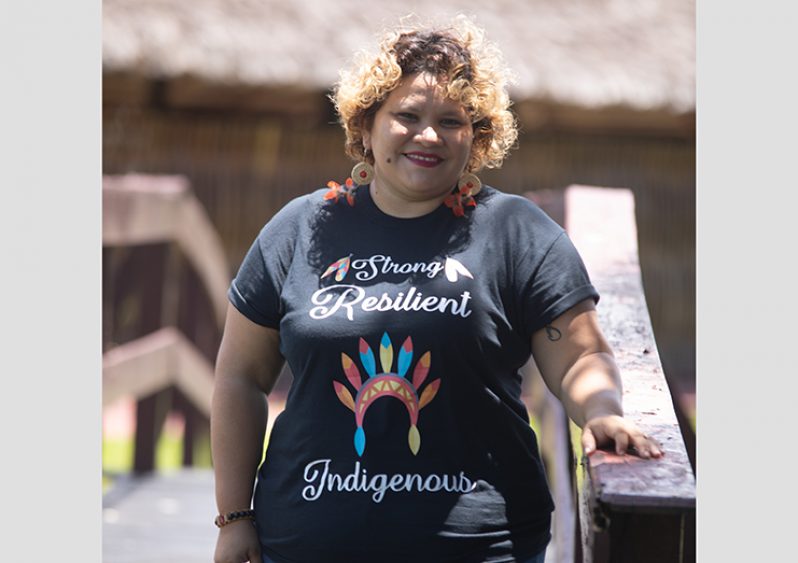By Naomi Parris

TOURISM is Guyana’s third largest export industry, based on conservative estimates. It contributed $30.1 billion to the country’s economy in 2018 alone, and tourism is unlike any other industry since it has the potential to outlive the extractive industries such as gold, bauxite, oil and gas.
Cognisant of this, one woman has established a way of using tourism not only to build the country’s economy, but also to celebrate and promote Guyana’s first peoples, the Amerindians.
Thirty-eight-year-old Candace Phillips started the initiative some five years ago, with Guyana’s first and — to date — only regional destination management organisation, ‘Visit Rupununi’.
The Rupununi region is known for its varying of landscapes sculpted by savannahs, forests, wetlands, rivers and creeks, and ‘Visit Rupununi’ is the ideal agency to go for all wants and knows about the tourism destinations.
Phillips was born in the village of Santa Rosa; however, she spent only the first nine months of her life there. She grew up in Guyana’s capital city, Georgetown, where she attended the St. Margaret’s Primary School, the Bishops’ High School and later pursued studies in Economics at the University of Guyana.
According to Phillips, her life was “mapped out” and she was planning to become a corporate lawyer.
However, fate seemed to have other plans for Phillip since soon after, she gained employment with the Amerindian People’s Association (APA) as a programme assistant, an opportunity which, she said, “opened her eyes” to aspects of her culture that she believed had been missing in her life, having grown up in the urban setting of the city life in Georgetown.
“I always wanted to know more about where I came from and not only about myself, about other Indigenous Peoples of Guyana,” Phillips said.
‘A life-changing moment’

Phillips disclosed that working with the APA changed her life, since it allowed her to work with various communities throughout Guyana and to learn about her culture, “Wherever I go, I try to absorb as much and try to understand the different aspects of culture and the differences between the nine indigenous tribes in Guyana.”
In 2015, while living and working as a Teacher in Aishalton, Rupununi, Phillips took an opportunity to work with Conservation International as a tourism coordinator which required her to develop a Regional Destination Management Organisation, which aims to build cohesiveness and inclusiveness.
Phillips noted that forming such an organisation was not without its challenges, as many persons in the region were still new to the tourism industry.
“More so, because they have never heard of the term, sometimes I think it’s because I was a woman too, I was an indigenous woman at that, trying to lead something and I think that because there was not that great receptivity in the beginning, I think that really fuelled my energy to try to prove them wrong, to prove that we can actually do this,” Phillips explained.
Phillips now serves as a Travel Industry Development Officer with the Guyana Tourism Authority, a job which allows her to help Indigenous communities develop their tourism product.
Additionally, Phillips and the Visit Rupununi team have built a strong relationship with the Department of Tourism and the Guyana Tourism Authority, so information is shared and help is garnered when needed.
Her job entails shortlisting indigenous communities with tourism potential, community engagements, meeting with village councils and focusing on each community’s uniqueness and building on their strengths.
“So, when visitors go, whether they be domestic or international travellers, they could have a very enriching experience and making sure that all along the line that indigenous communities are involved in the process and at the end of the day they are the right holders; they are the people who own this project, we are just facilitators of a process,” Phillips said.
‘A greater value’
According to Phillips, tourism promotes Indigenous culture and keeps identity intact with an aspect of conservation. “Tourism is one of the sectors that helps communities to understand that there is much greater value in keeping this tree standing or that bird flying, rather than selling it, because if I sell it, I’ll get $25,000 today but if I keep it there, tourists or visitors [will] keep coming that [money] could be multiplied,” she noted. “It’s very important for us to maintain the identity of the communities, and not to stray away or to impose something different, but to build on that to safeguard their rights and at the end of the day, the people must feel that this is their product and the only way you can do that is by having a partnership with them.”
While there is still some stigma attached to the Indigenous communities and its peoples, having experienced some discrimination herself, Phillips is optimistic that individuals can strive to change perceptions. “I think that with commitment, dedication, hard work and you can really show results that is [sic] your driving force at the end of the day, so I don’t worry about people saying you’re a woman, you are Indigenous and you can’t do this. I look and I know my strength and what I bring to the table” she said.
As Guyana observes Amerindian Heritage Month this year, Phillips is hoping to see that Guyanese will give the indigenous community the respect they so deserve. “Less discrimination, more appreciation for our culture and what we bring to the table as a people. We have a very strong identity and we come with so much history,” she said.




.png)









